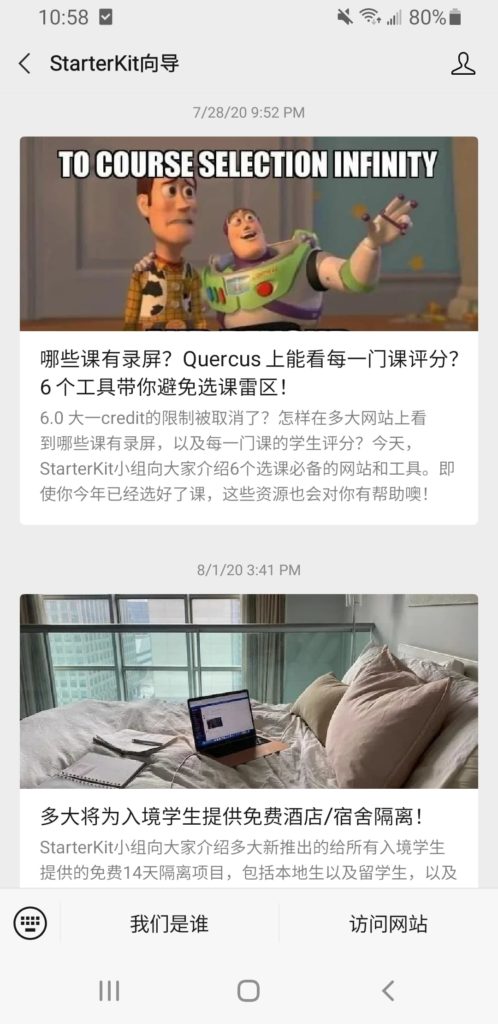This blog post is part of a series on the happenings of Munk One students and alumni over the course of Summer 2020. Check back in the coming weeks as we feature more students and their various stories of self-discovery, academic exploration, and more. In this post, Andrew Yin (’18) shares an initiative he created over the summer to bridge the divide between Chinese international students and the University, and what it has meant to him.
By Andrew Yin
In March, the sudden closure of the University and the lockdown of Ontario threw many of us into a panic. I returned to live with my mom in Richmond Hill, packing only two weeks of clothing with me, as I thought it would all pass quickly. Alas, that was not to be, as the supposed two-week sojourn turned into half a year of staying at home.
I am lucky to have my parents in proximity. Through the summer, my mom tried to cook something different every day, and of course I gained weight. However, the situation has been much different for my international student friends. Many of them struggled about whether to return to their home countries, or how to do so. The pandemic in China had largely subsided by April, however, flights sold like hotcakes and were ridiculously expensive. Their anxieties were fuelled by the uncertainties of the University’s arrangements for the upcoming school year. Would courses be online? Would they have to stay in Toronto for school?
I came to know these concerns through WeChat conversations and posts. During the pandemic, WeChat became a crucial communication tool for Chinese Canadians like me, who have family members on both sides of the Pacific. As a daily user of WeChat, I benefit from its reach, but was also alarmed at the amount of misinformation and the lack of information – specifically on the University’s plans. This gave me the idea to create a public WeChat account to share reliable campus information and resources to international students and their families in China.
In May, I proposed this idea to Donald Boere, Assistant Principal and Registrar at Innis College, and my work-study supervisor, who immediately offered his support. I have already been working on Innis projects, such as its alumni profile sharing website, fastforward. Innis also hosts StarterKit, a website aiming to provide campus resources and advice from a student-to-student perspective. I thought that my project could be an extension of StarterKit, as I named it “StarterKit向导” (“向导” is the Chinese word for “guide”). With the name set, it was time for me to get to work, marking the beginning of a digital adventure.
One of the most challenging parts of the project was navigating WeChat’s myriad restrictions, especially for non-Chinese citizens. In fact, one must be a Chinese citizen to set up an individual WeChat public account. I spent many hours figuring out caveats, but I would not have been able to set up the account without the help of family members in China. Another challenge was scouring the many webpages on U of T’s pandemic plans. Fortunately, as I was preparing my first post, the Faculty of Arts and Sciences published its Q&A for the 2020-21 school year. The new information got my adrenaline pumping. I barely processed it myself as I rushed to translate the article, which I published the following day. I received great feedback on the article, which encouraged me to keep going.
A surprising moment happened after I wrote and published an article on the university’s new academic VPN for students and faculty in China. I thought that students would be interested in knowing about this service, but I clearly underestimated the extent. I gasped in awe as I witnessed readership climbing into the 5-digit territory. As of writing, the article has gained over 10,000 reads, by far the most read article on the account. I can’t deny being proud of the achievement and being glad that so many people found out about this free service and found it helpful.
While I continue to work on posts, the project has achieved personal significance as a bridge across my identity divisions. As a “generation 1.5” immigrant, I grew up in both China and Canada. As a result, I seem to have different mindsets depending on which language I am using and who I am talking to. I share my thoughts in Chinese on WeChat and in English on Facebook, depending on the situation. The people of Chinese ethnicity in my social circle include old pals in China, international students, and Canadian-born Chinese. While I enjoy jumping between these groups, I often find that my values and views do not fully align with any of them. Who do I really identify with? Where do I fit it? I often struggle with these questions, sometimes deliberately burying one side of me.
This summer, as I dug through English web pages for information, synthesizing and translating the information into Chinese posts, I realized that I was carving out a niche for myself. On the one hand, my connections with international students allow me to empathize with their concerns and understand their concerns over access to campus resources. On the other hand, my Canadian experiences and English abilities opened the door to many on-campus opportunities, as I gained knowledge of campus resources. Without either side, I probably would not have had the desire and ability to start the WeChat project. Writing posts, I am simultaneously reconciling with myself, and gradually clearing away my conflicts and confusions as I embrace my identity.
Such bridges across languages and cultures are impactful and much needed today. Recently, I discovered that the university has created a Weibo account. I am glad that U of T is reaching across the firewall and across language divides, especially during these uncertain times. As for my WeChat posts, I hope they will not only continue to connect students within the University community, but also allow me to appreciate myself and my identity.


